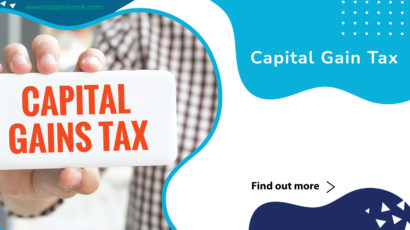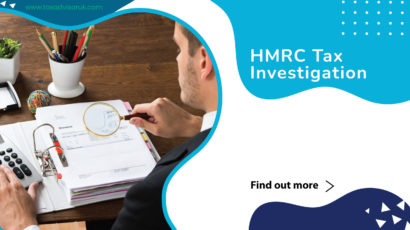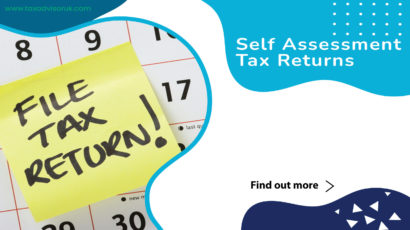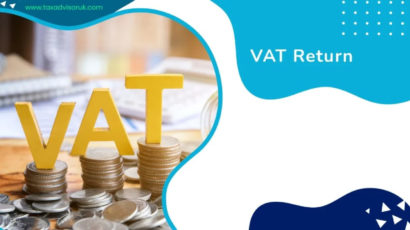We are scared of things that go bump in the night and the monster that may or may not be lurking beneath our beds as youngsters, which is referred to as primal fear of the unknown. As an adult, this dread does not go away, but it takes on a somewhat different form. The threat of an HMRC tax inquiry, which is especially scary if you have never faced one before, is one such monster beneath the bed. HMRC suspects of not paying the correct amount of tax or failing to file tax returns on time are in a difficult situation.
HMRC tax investigations can be stressful for any company, but there are several strategies you can use to make the process as smooth as possible. To help small businesses better comprehend the notion of HMRC tax investigations, we’ve put together this information.
We will discuss the following topics in this article:
- What is an HMRC tax investigation?
- What triggers a tax investigation?
- What types of tax investigations are carried out by HMRC?
- What business taxes does HMRC investigate?
- How far back can HMRC go during a tax investigation?
- When does a tax investigation end?
- Can I get the tax investigation cover?
- How to avoid an HMRC tax investigation?
What is an HMRC tax investigation?
When Her Majesty’s Revenue & Customs (HMRC) decides to investigate your company’s finances in order to guarantee that you are paying the correct amount of tax now and in the past, this is known as a tax investigation. If your company is chosen, you will receive an official investigation letter or a phone call from HMRC, informing you of the specifics of the inquiry. A tax probe by HMRC could include your:
- Amount of tax
- Accounts and tax calculations
- Self-assessment tax return
- Company tax return
- VAT returns and records (In case you’re VAT registered)
- PAYE returns and records (In case you’re an employer)
If you have strict accounting practises in place and a good accountant, a tax examination should not be too onerous or time-consuming. For prompt return filing and tax payment, contact Tax Advisor Accountants. Tax Advisor accountants ensure that you stay compliant and up to date with all tax legislation so that you don’t have to deal with any future HMRC tax investigations.
What triggers a tax investigation?
If there are errors in the submitted tax return then HMRC initiates the investigation to ensure compliance. HMRC may take notice if all of a sudden a smaller company shows a higher VAT claim or a large company generates a very low tax figure.
If any of the following things continue to happen, your company could be the subject of a tax investigation:
- If you work in a high-risk industry and frequently take cash payments,
- If your income has dropped significantly, your costs have increased, or your returns are inconsistent.
- If you file your returns late on a regular basis.
- If you’re charging more than the industry standard.
- If you operate in a sector that HMRC has identified as a priority.
- If your tax returns do not reflect your current living situation.
- If HMRC is notified of a tip
Use the services of a tax professional to resolve any tax problems and avoid HMRC tax inquiries.
What types of tax investigations are carried out by HMRC?
HMRC conducts three different types of tax investigations:
- Full enquiry – During a comprehensive enquiry/investigation, HMRC will examine all of your business documents, usually when they believe there is a significant possibility of a tax mistake. While investigating limited firms, they may check into the tax affairs of company directors as well as the business’s affairs.
- Aspect enquiry – An ‘aspect examination’ of your tax returns is typically a less time-consuming procedure than a ‘complete inquiry.’ HMRC may decide to investigate a specific aspect of your tax returns and request further information/details in this situation. This type of analysis often exposes a genuine mistake rather than a purposeful attempt by the company to avoid paying the right taxes.
- Random check –HMRC can conduct random checks at any moment, regardless of the health of your accounts or whether or not you’ve triggered an alert.
What business taxes does HMRC investigate?
Many individuals believe that HMRC’s tax investigations are limited to income tax matters, however this is not the case. HMRC may wish to conduct tax investigations into a number of different taxes, including –
- VAT
- Capital gains tax
- Corporation tax
- IR35
- Construction industry scheme (CIS)
Contact Tax Advisor UK Accountants if your company is currently dealing with tax troubles or has complicated tax affairs that you are unable to resolve, and you are looking for a professional tax accountant to handle all of your tax-related concerns. It is right time to invest in a reliable accounting package to ensure that your finances are always in order and that all tax compliances are met.
How far back can HMRC go during a tax investigation?
HMRC can usually examine a taxpayer’s returns over the preceding four years to see if the taxpayer owes any money. If your returns are littered with evident errors, however, HMRC has the ability to investigate them for up to six years. It can also examine back 20 years of your tax returns if it appears that you’ve been attempting to avoid paying taxes on purpose.
When does a tax investigation end?
The issuance of a decision notice or the signing of a contract settlement signals the official end of an investigation.
- Decision notices are usually sent in the form of a letter detailing the final decision, which may include a penalty or assessment.
- A contract settlement is a legally binding agreement between HMRC and the taxpayer in which the taxpayer agrees to pay the money and HMRC agrees not to use its collection authorities.
Note: Once a return has been investigated, it cannot be looked into again.
Can I get the tax investigation cover?
Audits of Tax are not only burdensome, but they may also be expensive. Investigations are time-consuming, in addition to the prospect of an additional tax bill and penalties. To offset the cost of this lost time, you could get tax investigation insurance. Tax Advisor UK Accountants offers tax investigation insurance to safeguard your company from HMRC investigations. Tax Advisor UK will assist you with the investigation, and your case will be handled by a professional to give you complete peace of mind.
How to avoid an HMRC tax investigation?
1.Use the online accounting interface of Tax Advisor UK.
- Purchase Tax Investigation Insurance.
- Make sure you give your accountant a complete and accurate accounting of your finances.
- Maintain precise and full books and records in order to verify the amounts on your tax return.
- Keep cash transactions to a minimum: if you pay cash, make sure you get a receipt.
- File and pay your tax returns on time.
- Take ownership of your tax affairs: sign your returns knowing they are complete and precise.
Keep in mind that HMRC has access to a large amount of data, including property transactions and bank accounts. Nothing is beyond their purview; in fact, HMRC is the only government agency with the legal authority to access your home without a warrant. If you have any concerns regarding your tax situation, please contact our account manager as soon as possible.
How TaxAdvisor UK can help
At TaxAdvisor UK , our experts will provide you 30 minutes free consultation and help you in managing all your tax and accounting work. Speak to our expert accountants, tax advisor on (0203) 5381276 or fill an online form today. We can have a consultation session over the phone, virtual or face to face meeting and will provide you with a no obligation fixed quote

















